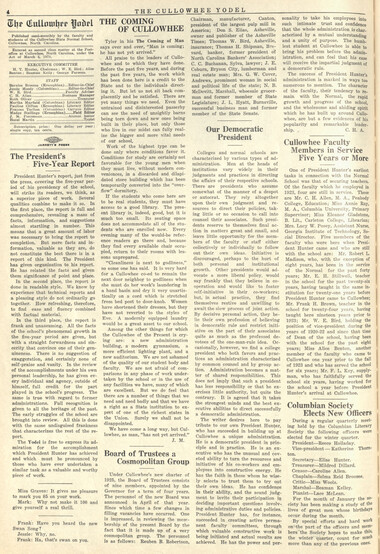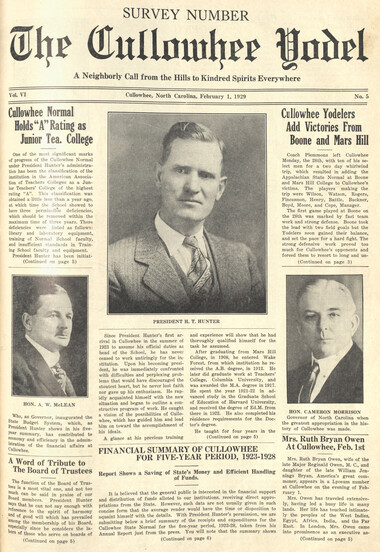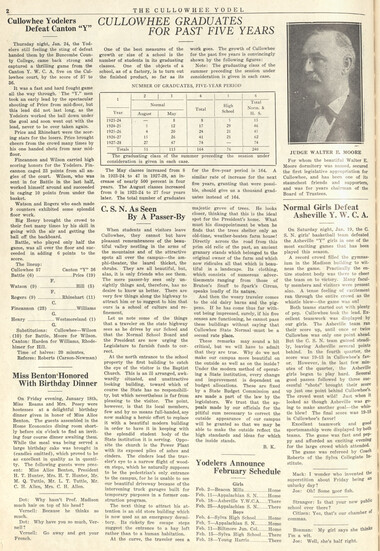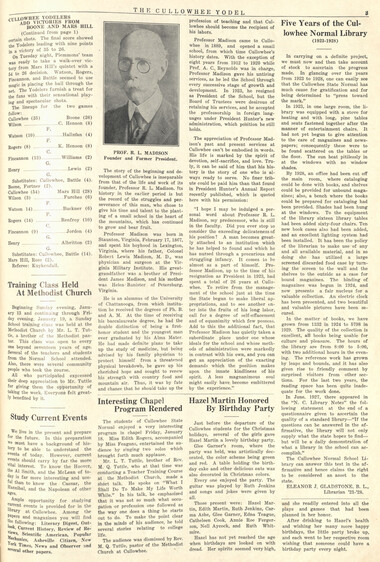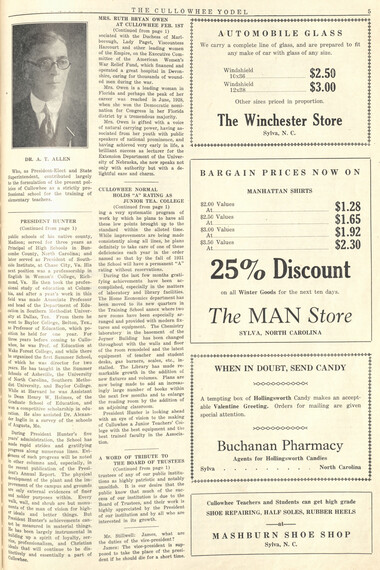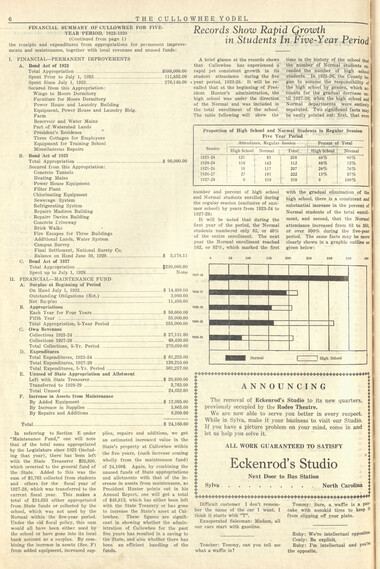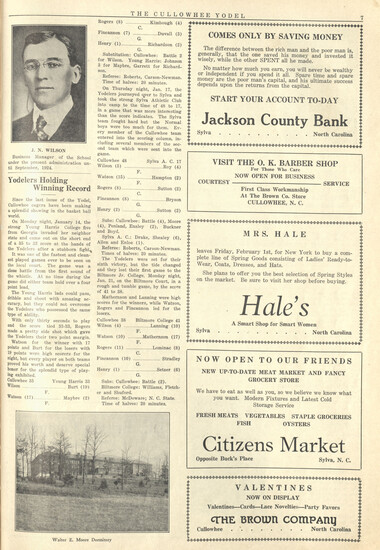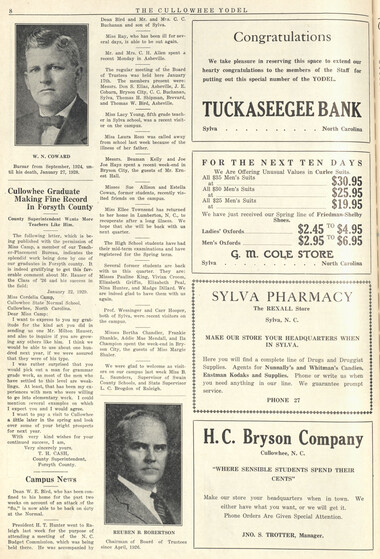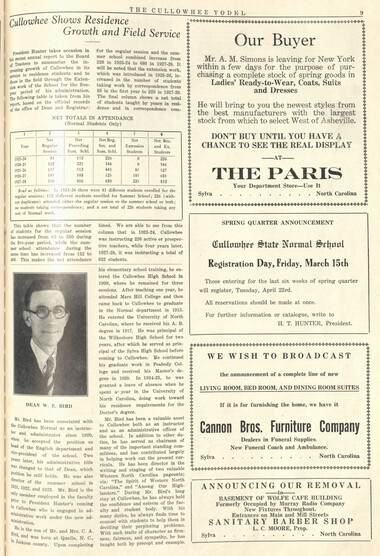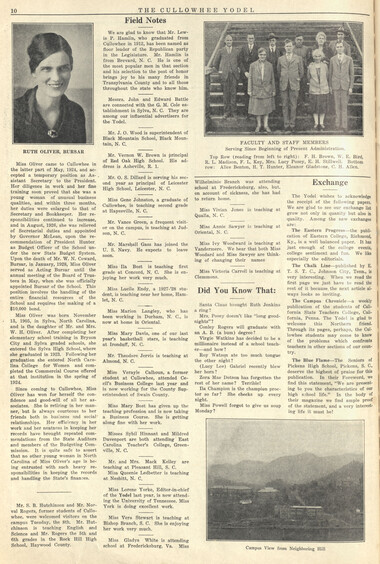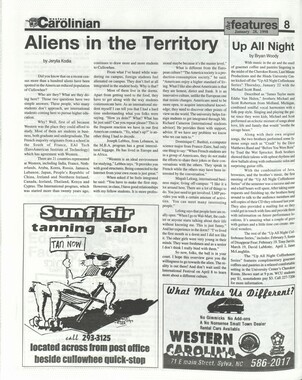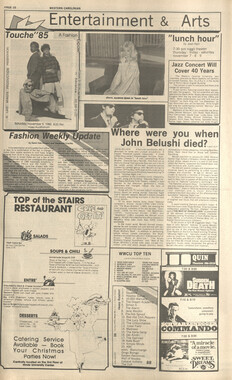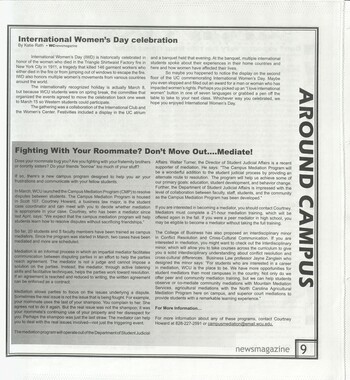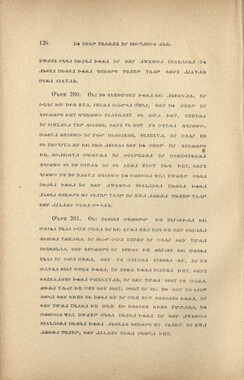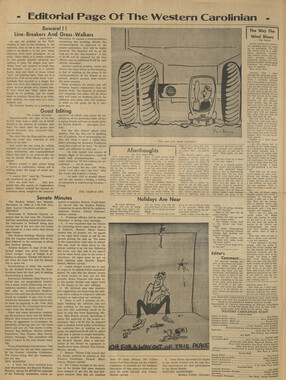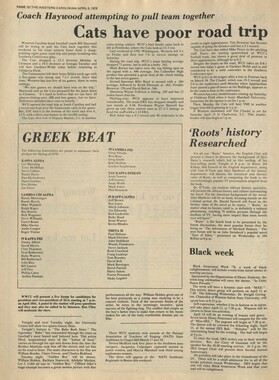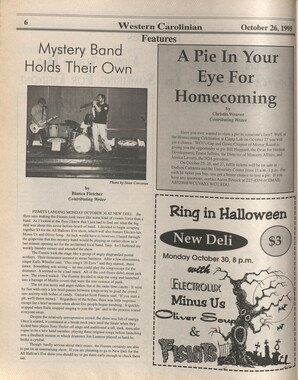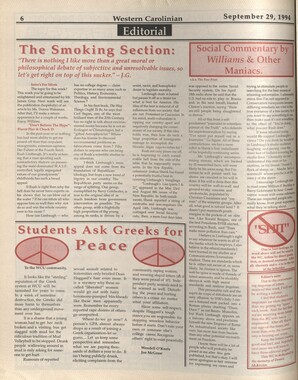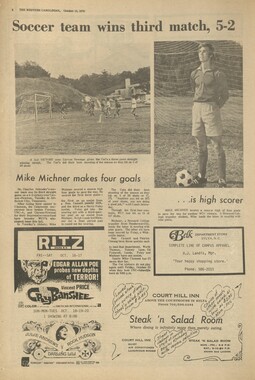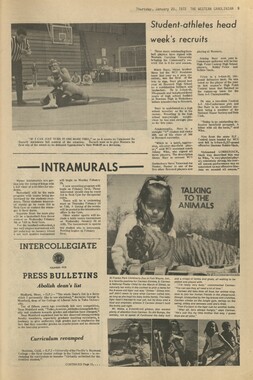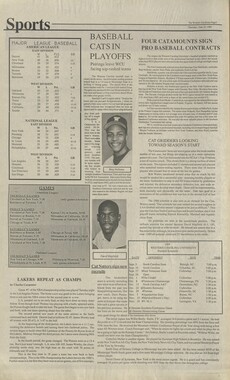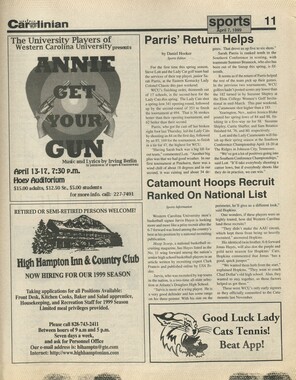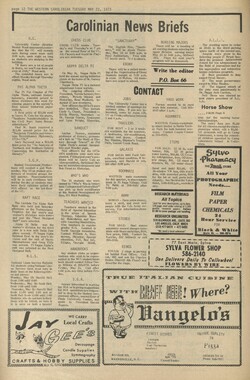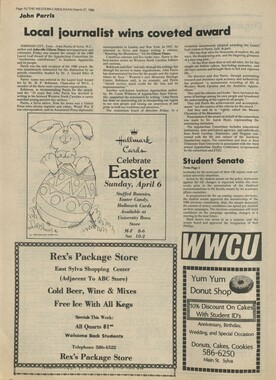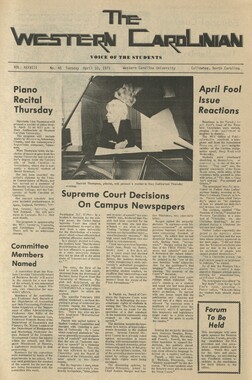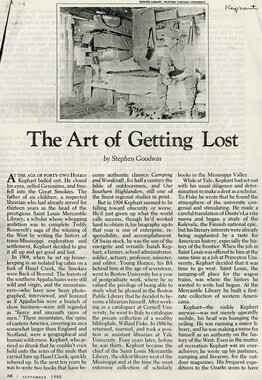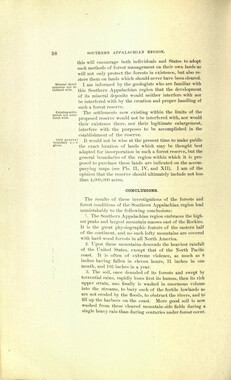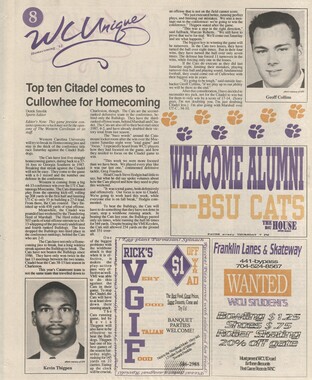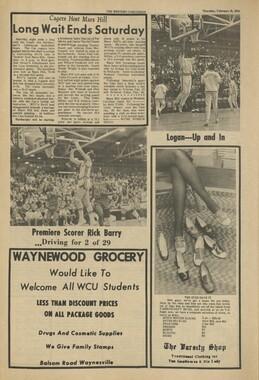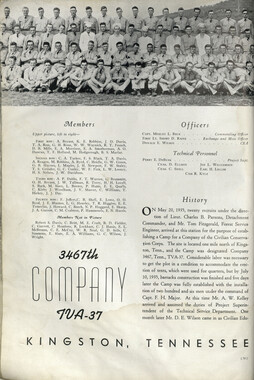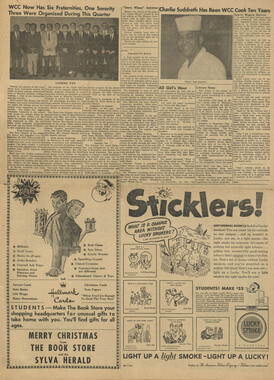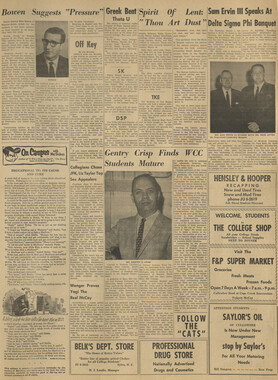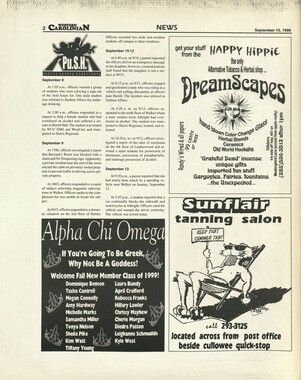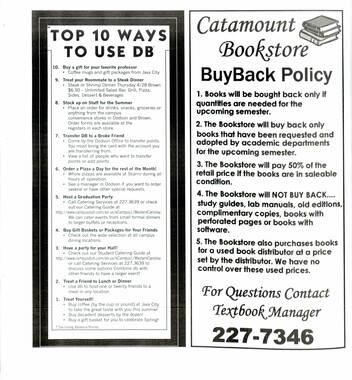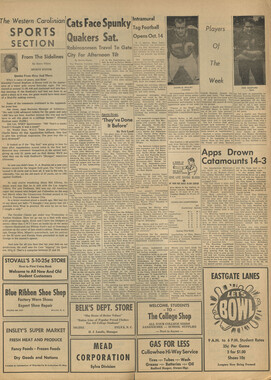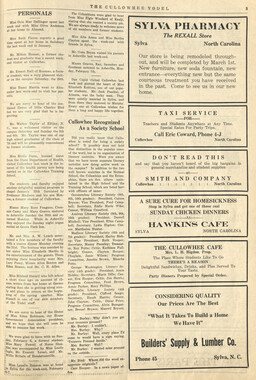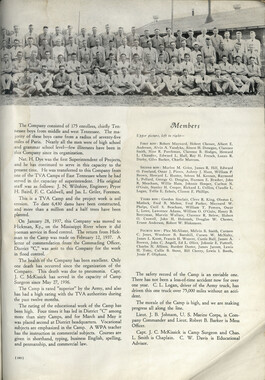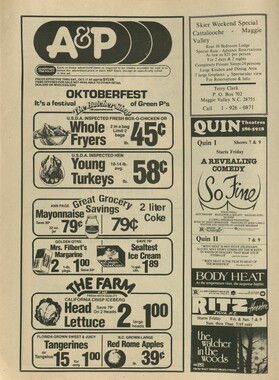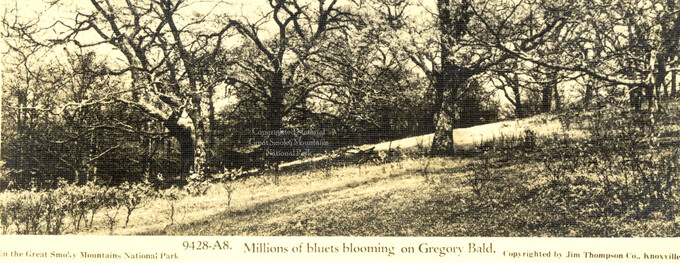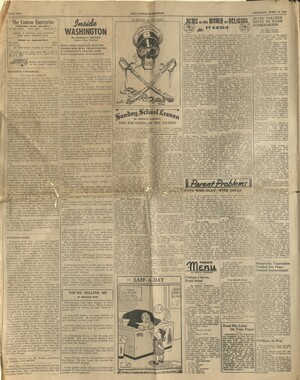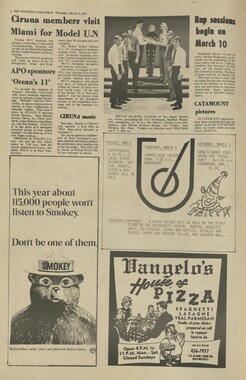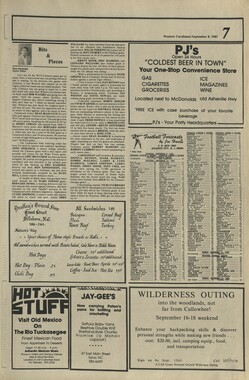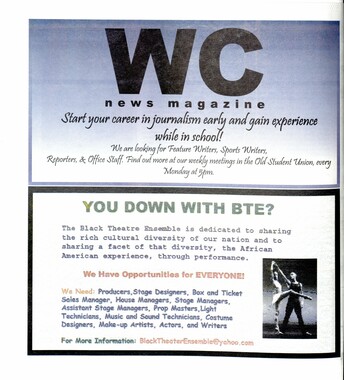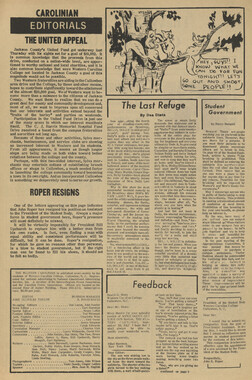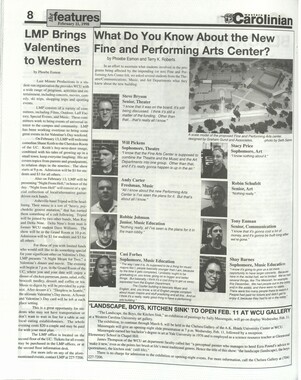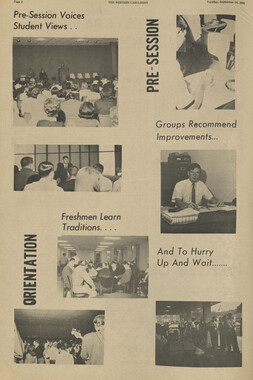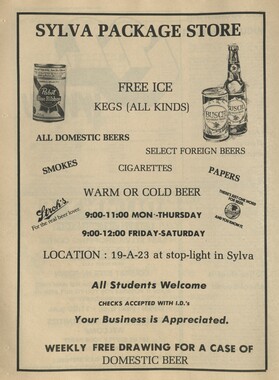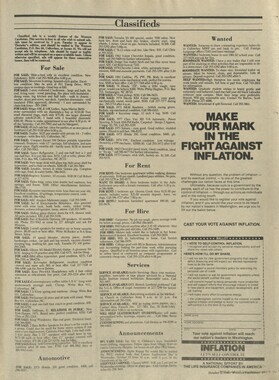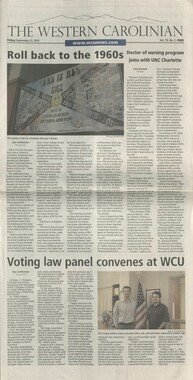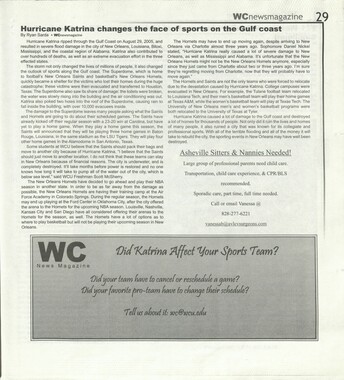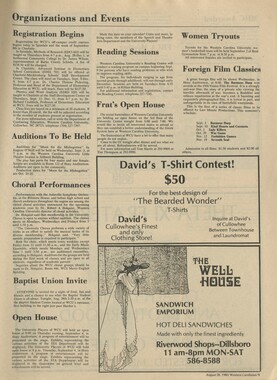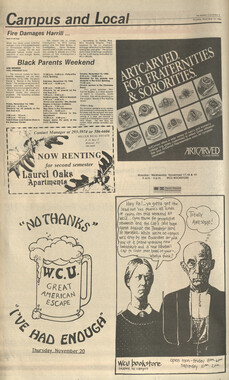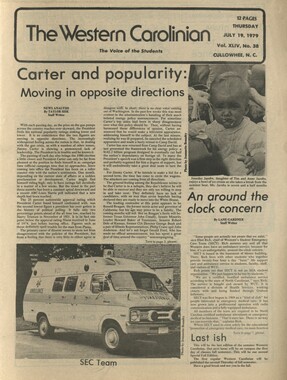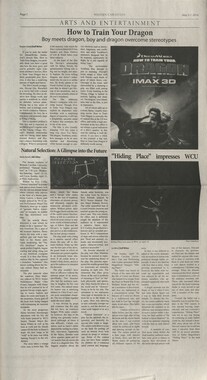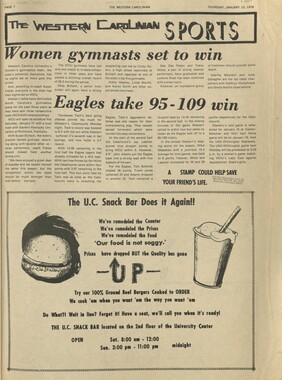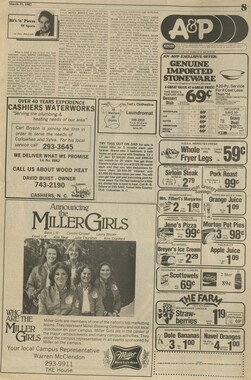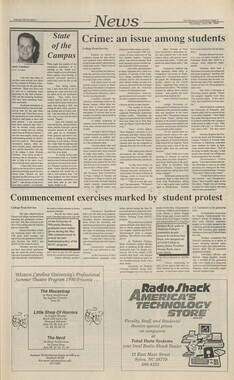Western Carolina University (21)
View all
- Canton Champion Fibre Company (2308)
- Cherokee Traditions (291)
- Civil War in Southern Appalachia (165)
- Craft Revival (1942)
- George Masa Collection (137)
- Great Smoky Mountains - A Park for America (3080)
- Highlights from Western Carolina University (422)
- Horace Kephart (973)
- Journeys Through Jackson (159)
- LGBTQIA+ Archive of Jackson County (89)
- Oral Histories of Western North Carolina (318)
- Picturing Appalachia (6617)
- Stories of Mountain Folk (413)
- Travel Western North Carolina (153)
- Western Carolina University Fine Art Museum Vitreograph Collection (129)
- Western Carolina University Herbarium (92)
- Western Carolina University: Making Memories (738)
- Western Carolina University Publications (2491)
- Western Carolina University Restricted Electronic Theses and Dissertations (146)
- Western North Carolina Regional Maps (71)
- World War II in Southern Appalachia (131)
University of North Carolina Asheville (6)
View all
- Allanstand Cottage Industries (62)
- Appalachian National Park Association (53)
- Bennett, Kelly, 1890-1974 (1463)
- Berry, Walter (76)
- Brasstown Carvers (40)
- Carver, George Washington, 1864?-1943 (26)
- Cathey, Joseph, 1803-1874 (1)
- Champion Fibre Company (233)
- Champion Paper and Fibre Company (297)
- Cherokee Indian Fair Association (16)
- Cherokee Language Program (22)
- Crowe, Amanda (40)
- Edmonston, Thomas Benton, 1842-1907 (7)
- Ensley, A. L. (Abraham Lincoln), 1865-1948 (275)
- Fromer, Irving Rhodes, 1913-1994 (70)
- George Butz (BFS 1907) (46)
- Goodrich, Frances Louisa (120)
- Grant, George Alexander, 1891-1964 (96)
- Heard, Marian Gladys (60)
- Kephart, Calvin, 1883-1969 (15)
- Kephart, Horace, 1862-1931 (313)
- Kephart, Laura, 1862-1954 (67)
- Laney, Gideon Thomas, 1889-1976 (439)
- Masa, George, 1881-1933 (61)
- McElhinney, William Julian, 1896-1953 (44)
- Niggli, Josephina, 1910-1983 (10)
- North Carolina Park Commission (105)
- Osborne, Kezia Stradley (9)
- Owens, Samuel Robert, 1918-1995 (11)
- Penland Weavers and Potters (36)
- Roberts, Vivienne (15)
- Roth, Albert, 1890-1974 (142)
- Schenck, Carl Alwin, 1868-1955 (1)
- Sherrill's Photography Studio (2565)
- Southern Highland Handicraft Guild (127)
- Southern Highlanders, Inc. (71)
- Stalcup, Jesse Bryson (46)
- Stearns, I. K. (213)
- Thompson, James Edward, 1880-1976 (226)
- United States. Indian Arts and Crafts Board (130)
- USFS (683)
- Vance, Zebulon Baird, 1830-1894 (1)
- Weaver, Zebulon, 1872-1948 (58)
- Western Carolina College (230)
- Western Carolina Teachers College (282)
- Western Carolina University (2008)
- Western Carolina University. Mountain Heritage Center (18)
- Whitman, Walt, 1819-1892 (10)
- Wilburn, Hiram Coleman, 1880-1967 (73)
- Williams, Isadora (3)
- Cain, Doreyl Ammons (0)
- Crittenden, Lorraine (0)
- Rhodes, Judy (0)
- Smith, Edward Clark (0)
- Appalachian Region, Southern (3032)
- Asheville (N.C.) (1945)
- Avery County (N.C.) (26)
- Blount County (Tenn.) (195)
- Buncombe County (N.C.) (1680)
- Cherokee County (N.C.) (283)
- Clay County (N.C.) (556)
- Graham County (N.C.) (238)
- Great Smoky Mountains National Park (N.C. and Tenn.) (525)
- Haywood County (N.C.) (3573)
- Henderson County (N.C.) (70)
- Jackson County (N.C.) (4925)
- Knox County (Tenn.) (35)
- Knoxville (Tenn.) (13)
- Lake Santeetlah (N.C.) (10)
- Macon County (N.C.) (421)
- Madison County (N.C.) (216)
- McDowell County (N.C.) (39)
- Mitchell County (N.C.) (135)
- Polk County (N.C.) (35)
- Qualla Boundary (982)
- Rutherford County (N.C.) (78)
- Swain County (N.C.) (2185)
- Transylvania County (N.C.) (270)
- Watauga County (N.C.) (12)
- Waynesville (N.C.) (86)
- Yancey County (N.C.) (72)
- Aerial Photographs (3)
- Aerial Views (60)
- Albums (books) (4)
- Articles (1)
- Artifacts (object Genre) (228)
- Bibliographies (1)
- Biography (general Genre) (2)
- Cards (information Artifacts) (38)
- Clippings (information Artifacts) (192)
- Copybooks (instructional Materials) (3)
- Crafts (art Genres) (622)
- Depictions (visual Works) (21)
- Design Drawings (1)
- Digital Moving Image Formats (2)
- Drawings (visual Works) (185)
- Envelopes (101)
- Exhibitions (events) (1)
- Facsimiles (reproductions) (1)
- Fiction (general Genre) (4)
- Financial Records (12)
- Fliers (printed Matter) (67)
- Glass Plate Negatives (381)
- Guidebooks (2)
- Internegatives (10)
- Interviews (823)
- Land Surveys (102)
- Letters (correspondence) (1045)
- Manuscripts (documents) (618)
- Maps (documents) (177)
- Memorandums (25)
- Minutes (administrative Records) (59)
- Negatives (photographs) (6090)
- Newsletters (1290)
- Newspapers (2)
- Notebooks (8)
- Occupation Currency (1)
- Paintings (visual Works) (1)
- Pen And Ink Drawings (1)
- Periodicals (194)
- Personal Narratives (10)
- Photographs (12977)
- Plans (maps) (1)
- Poetry (6)
- Portraits (4568)
- Postcards (329)
- Programs (documents) (181)
- Publications (documents) (2444)
- Questionnaires (65)
- Relief Prints (26)
- Sayings (literary Genre) (1)
- Scrapbooks (282)
- Sheet Music (2)
- Slides (photographs) (402)
- Songs (musical Compositions) (2)
- Sound Recordings (802)
- Specimens (92)
- Speeches (documents) (18)
- Tintypes (photographs) (8)
- Transcripts (329)
- Text Messages (0)
- A.L. Ensley Collection (275)
- Appalachian Industrial School Records (7)
- Appalachian National Park Association Records (336)
- Axley-Meroney Collection (2)
- Bayard Wootten Photograph Collection (20)
- Bethel Rural Community Organization Collection (7)
- Blumer Collection (5)
- C.W. Slagle Collection (20)
- Canton Area Historical Museum (2110)
- Carlos C. Campbell Collection (462)
- Cataloochee History Project (64)
- Cherokee Studies Collection (4)
- Daisy Dame Photograph Album (5)
- Daniel Boone VI Collection (1)
- Doris Ulmann Photograph Collection (112)
- Elizabeth H. Lasley Collection (1)
- Elizabeth Woolworth Szold Fleharty Collection (4)
- Frank Fry Collection (95)
- George Masa Collection (173)
- Gideon Laney Collection (452)
- Hazel Scarborough Collection (2)
- Hiram C. Wilburn Papers (28)
- Historic Photographs Collection (236)
- Horace Kephart Collection (861)
- Humbard Collection (33)
- Hunter and Weaver Families Collection (1)
- I. D. Blumenthal Collection (4)
- Isadora Williams Collection (4)
- Jesse Bryson Stalcup Collection (47)
- Jim Thompson Collection (224)
- John B. Battle Collection (7)
- John C. Campbell Folk School Records (80)
- John Parris Collection (6)
- Judaculla Rock project (2)
- Kelly Bennett Collection (1482)
- Love Family Papers (11)
- Major Wiley Parris Civil War Letters (3)
- Map Collection (12)
- McFee-Misemer Civil War Letters (34)
- Mountain Heritage Center Collection (4)
- Norburn - Robertson - Thomson Families Collection (44)
- Pauline Hood Collection (7)
- Pre-Guild Collection (2)
- Qualla Arts and Crafts Mutual Collection (12)
- R.A. Romanes Collection (681)
- Rosser H. Taylor Collection (1)
- Samuel Robert Owens Collection (94)
- Sara Madison Collection (144)
- Sherrill Studio Photo Collection (2558)
- Smoky Mountains Hiking Club Collection (616)
- Stories of Mountain Folk - Radio Programs (374)
- The Reporter, Western Carolina University (510)
- Venoy and Elizabeth Reed Collection (16)
- WCU Gender and Sexuality Oral History Project (36)
- WCU Mountain Heritage Center Oral Histories (25)
- WCU Oral History Collection - Mountain People, Mountain Lives (71)
- WCU Students Newspapers Collection (1923)
- Western North Carolina Tomorrow Black Oral History Project (69)
- William Williams Stringfield Collection (2)
- Zebulon Weaver Collection (109)
- African Americans (390)
- Appalachian Trail (35)
- Artisans (521)
- Cherokee art (84)
- Cherokee artists -- North Carolina (10)
- Cherokee language (21)
- Cherokee pottery (101)
- Cherokee women (208)
- Church buildings (190)
- Civilian Conservation Corps (U.S.) (111)
- College student newspapers and periodicals (2012)
- Dams (108)
- Dance (1023)
- Education (222)
- Floods (63)
- Folk music (1015)
- Forced removal, 1813-1903 (2)
- Forest conservation (220)
- Forests and forestry (1198)
- Gender nonconformity (4)
- Great Smoky Mountains National Park (N.C. and Tenn.) (181)
- Hunting (47)
- Landscape photography (25)
- Logging (122)
- Maps (83)
- Mines and mineral resources (9)
- North Carolina -- Maps (18)
- Paper industry (38)
- Postcards (255)
- Pottery (135)
- Railroad trains (72)
- Rural electrification -- North Carolina, Western (3)
- School integration -- Southern States (2)
- Segregation -- North Carolina, Western (5)
- Slavery (5)
- Sports (452)
- Storytelling (243)
- Waterfalls -- Great Smoky Mountains (N.C. and Tenn.) (66)
- Weaving -- Appalachian Region, Southern (280)
- Wood-carving -- Appalachian Region, Southern (328)
- World War, 1939-1945 (173)
Cullowhee Yodel Volume 06 Number 05
Item
Item’s are ‘child’ level descriptions to ‘parent’ objects, (e.g. one page of a whole book).
-
-
THE CULLOWHEE YODEL Utyr (£ullatt%? futol sS sgg^fiASws £i 4» ape er at th Jtt i; ■■■sss.'wrAS.ss 4AUCe A^lf II ^H~ -a ssv 3.-' ollar pe year; j3*l. The President's Five-Year Report President Hunter's report, just from the press, covering the five-year period of his presidency of the school, will strike its readers, we think, as a superior piece of work. Several qualities combine to make it so. In the first place, the report is full and comprehensive, revealing a mass of facts, information, and suggestions almost startling in number. This means that a great amount of labor was necessary to bring the report to completion. But mere facts and information, valuable as they are, do not constitute the best there is in a report of this kind. The President has given organization to his report. He has related the facts and given them significance of point and place. In the second place, the report is done in readable style. We know by experience that technical reports and a pleasing style do not ordinarily go together. How refreshing, therefore, to find ease and fluency combined with factual material. In the third place, the report is frank and unassuming. All the facts of the school's phenomenal growth in the five-year period are given, but with a straight forwardness and sincerity that convince one of their genuineness. There is no suggestion of exaggeration, and certainly none of self-praise and vanity. In the review of the accomplishments under his own personal leadership, he has given every individual and agency, outside of himself, full credit for the part played in the school's progress. The same is true with regard to former administrations. Full recognition is given to all the heritage of the past. The early struggles of the school are brought into review. All this is done with the same undisguised frankness that characterizes the rest of the re- The Yodel is free to express its admiration for the accomplishment which President Hunter has achieved and which must be pronounced by those who have ever undertaken a similar task as a valuable and worthy piece of work. Miss Graves: It gives me pleasure to mark you 85 on your work. Mark: Why not make it 100 and give yourself a real thrill. Frank: Have you heard the n Swan Song? Jessie: Why, no. Frank: Ha, that's swan on you. THE COMING OF CULLOWHEE Tyler in his The Coming of Man says over and over, "Man is coming; he has not yet arrived." All praise to the leaders of Cullowhee and to which they have done. Before the past five years, and during the past five years, the work which has been done here is a credit to the State and to the individuals directing it. But let us not sit back complacently and be satisfied. There are yet many things we need. Even the untrained and disinterested passerby can see the need of unsightly barns being torn down and new ones being built in their place, but only those who live in our midst can fully realize the bigger and more vital needs of our school. Work of the highest type can be done only where conditions favor it. Conditions for study are certainly not favorable for the young men when they must live, without modern conveniences, in a discarded and dilapidated store building which has been temporarily converted into the "overflow" dormitory. If the students who come here are to be real students, they must have access to a good library. The present library is, indeed, good, but it is much too small. Its seating space does not accommodate all of the students who are enrolled now. Every evening many of the would-be reference readers go there and, because they find every available chair occupied, return to their rooms with lessons unprepared. "Cleanliness is next to godliness," so some one has said. It is very hard for a Cullowhee co-ed to remain the next door neighbor to godliness when she must do her week's laundering in a hand basin and dry it very unartis- tically on a cord which is stretched from bed post to door-knob. Women have shortened their dresses, but they have not reverted to the styles of Eve. A modernly equipped laundry would be a great asset to our school. Among the other things for which the Cullowhee of the Present is crying are: a new administration building, a modern gymnasium, a more efficient lighting plant, and a new auditorium. We are not ashamed of the quality of our student body and faculty. We are not afraid of comparisons in any phase of work undertaken by the school or in the use of any facilities we have, many of which are excellent. But we do feel that there are a number of things that we need and need badly and that we have a right as a State institution to expect of one of the richest states in the Union. Surely we shall not be disappointed. We have come a long way, but Cullowhee, as man, "has not yet arrived." J. M. Chairman, manufacturer, Canton, president of the largest pulp mill in America; Don S. Elias, Asheville, owner and publisher of the Asheville Times; Thomas W. Bird, Asheville, insurance; Thomas H. Shipman, Brevard, banker, former president of North Carolina Bankers' Association; C. C. Buchanan, Sylva, lawyer; J. E. Coburn, Bryson City, lumberman and real estate man; Mrs. G. W. Cover, Andrews, prominent woman in social and political life of the state; N. B. McDevitt, Marshall, whoesale grocer- man and former member of State Legislature; J. L. Hyatt, Burnsville, successful business man and former member of the State Senate. Board of Trustees a Cosmopolitan Group Under Cullowhee's new charter of 1925, the Board of Trustees consists of nine members, appointed by the Governor for a term of four years. The personnel of the new Board was announced in April of that year. Since which time a few changes in filling vacancies have occurred. One is impressed, in reviewing the membership of the present Board by the fact that it is made up of a very cosmopolitan group. The personnel is as follows: Reuben B. Robertson, Our Democratic President Colleges and normal schools are characterized by various types of administration. Men at the heads of institutions vary widely in their judgments and practices in directing the affairs of their respective schools. There are presidents who assume somewhat of the manner of a despot or autocrat. They rely altogether upon their own judgment and resources to direct their policies, taking little or no occasion to call into counsel their associates. Such presidents reserve to themselves final action in matters great and small, and leave little opportunity for the members of the faculty or staff either collectively or individually to follow out their own ideas. Initiative is discouraged, perhaps to the hurt of both personal and institutional growth. Other presidents would advocate a more liberal policy, would say frankly that they believe in cooperation and would like to foster self-initiative in their co-workers; but, in actual practice, they find themselves restive and unwilling to await the slow process of joint action. By decisive personal action, they belie their own profession of believing in democratic rule and restrict initiative on the part of their associates quite as much as the professed devotees of the one-man-rule idea. Occasionally, however, we find a college president who both favors and practices an administration characterized by common counsel and by group action. Administration becomes a matter of shared responsibilities. This does not imply that such a president has less responsibility or that he exercises little authority, but quite the contrary. It is agreed that it takes the strongest minds and the best executive abilities to direct successfully a democratic administration. The writer desires here to pay tribute to our own President Hunter, who has succeeded in building up at Cullowhee a unique administration. He is a democratic president in principle and in practice. He is an executive who has the unusual and coveted ability to turn the resources and initiative of his co-workers and employees into constructive energy. He has the faith in those whom he wisely selects to trust them to try out their own ideas. He has confidence in their ability, and the sound judgment to invite their participation in deciding important questions involving administrative duties and policies. President Hunter has, for instance, succeeded in creating active permanent faculty committees, through which valuable constructive work is being initiated and actual results are achieved. He has the power and per sonality to take his employees into such intimate trust and confidence that the whole administration is characterized by a mutual understanding and a unity of purpose. The humblest student at Cullowhee is able to bring his problem before the administration, and can feel that his case will receive the impartial judgment of a democratic rule. The success of President Hunter's administration is maiked in ways too numerous to mention. The character of the faculty, their tendency to remain with the Normal, the rapid growth and progress of the school, and the wholesome and abiding spirit which he has built up around Cullowhee, are but a few evidences of his. popularity and remarkable leadership. , C. H. A. Cullowhee Faculty Members in Service Five Years or More One of President Hunter's earliest tasks in connection with the Normal School was that of securing teachers. Of the faculty which he employed in 1923, four are still in service. These are Mr. C. H. Allen, M. A., Peabody College, Education; Miss Annie Ray, M. A., Columbia University, Primary Supervisor; Miss Eleanor Gladstone, B. Lit., Carleton College, Librarian; Mrs. Lucy W. Posey, Assistant Nurse, Georgia Institute of Technology, Social Director. Five members of the faculty who were here when President Hunter came and who are still with the school are: Mr. Robert L Madison, who, with the exception of eight years, has been in the service of the Normal for the past forty years; Mr. E. H. Stillwell, teacher in the school for the past twenty-six years, having taught in the same institution for twenty-one years before President Hunter came to Cullowhee; Mr. Frank H. Brown, teacher in the school for twenty-four years, having taught here nineteen years prior to 1923; Mr. W. E. Bird, holding the position of vice-president during the years of 1920-22 and since that time of Dean of the school, having been with the school for the past eight years; Miss Alice Benton, another member of the faculty who came to Cullowhee one year prior to the fall of 1923 and who has served the school for six years; Mr. F. L. Key, supply- man, who has faithfully served the school six years, having worked for the school a year before President Hunter's arrival at Cullowhee. Columbian Society Elects New Officers During a regular quarterly meeting held by the Columbian Literary Society the following officers were elected for the winter quarter. President—Reece Holladay. Vice-president — Katherine Thornton. Secretary—Elise Hunter. Treasurer—Mildred Dillard. Censor—Caroline Allen. Chaplain—Selma Reid Broome. Critic—Miss Wools. Marshal—Beaman Kelley. Pianist—Lace McLean. For the month of January the society has been making a study of the lives of great men whose birthdays occur during the month. By special efforts and hard work on the part of the officers and members the Society hopes to make this, the winter quarter, count for much more than any of the previous ones.
Object
Object’s are ‘parent’ level descriptions to ‘children’ items, (e.g. a book with pages).
-
The Western Carolinian is Western Carolina University’s student-run newspaper. The paper was published as the Cullowhee Yodel from 1924 to 1931 before changing its name to The Western Carolinian in 1933.
-
